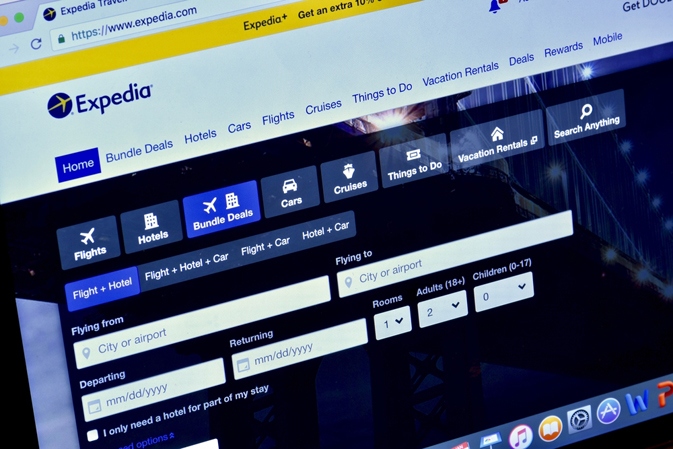This article originally ran in the May 25th, 2017 issue of Travelweek magazine. Canadian travel agents can subscribe for free to receive the magazine weekly here.
TORONTO — Flashback to 1996: Travel agencies are still reeling from the first wave of airline commission caps a year earlier. Then Expedia and Booking.com arrive on the scene. More online travel agencies (OTAs) start coming out of the woodwork, and suddenly the bricks-and-mortar retail travel industry is staring down huge revenue losses from the commission caps (and then cuts) just as OTAs begin siphoning off ever-increasing numbers of clientele. Few thought travel agents could survive the one-two punch, and the vultures were out.
And now? Just over 20 years later, the travel agents who survived (and later thrived) are earning commissions on everything from hotels to packages, car rentals and attractions from a most unlikely ally: the OTAs. Competition makes strange bedfellows and that’s as true in the travel industry as anywhere else.
Aren’t OTAs the bad guys? Booking.com’s Managing Director, Americas, Todd Dunlap says he thinks “some of that stuff is a little overstated”. Booking.com is currently testing out its Booking.com for Travel Agents trade platform, with tools the company says will help agents make and manage bookings for clients. It says travel agents who join the platform will be eligible for similar partner benefits as all Booking.com affiliate partners. The company currently has some 12,500 affiliates.

Aren’t OTAs the bad guys?
Dunlap, who was at the opening of the Booking.com Toronto office last month, says Booking.com handles millions of contacts every year. Some of those are from business travellers and corporate travel agencies. “We discovered one in five of our bookers were booking for business. So we’re looking at optimizing and growing that side of the business.”
And it’s not just travel agents booking corporate through OTAs, but leisure too. What about commissions? Dunlap wouldn’t reveal percentages at this stage but said Booking.com’s agent platform “will have tailored solutions for travel agents.” The OTA looks at the travel agent category as a strategic partnership, he added. “There’s power in selection. [Travel agents] have great access to conventional inventory. Now they may be looking for unconventional inventory because there’s a demand for that. If I’m a travel agent, I’m looking for inventory, and I’m looking for the best solutions for my clients.”
Booking.com got its start in Amsterdam in 1996 and was sold to OTA behemoth The Priceline Group (parent company of Kayak.com and Priceline.com) for US$133 million in 2005. The site now claims 1.2 million active properties in 220 countries, and 1.2 million room nights booked every 24 hours.

Luxury hotel Ciragan Palace in Istanbul won’t be found on Booking.com
The road to working with travel agencies is paved with good intentions but isn’t always smooth: in Turkey, the Association of Turkish Travel Agencies this past spring succeeded in blocking Booking.com from offering Turkish hotels to Turkish consumers in a court case that cites “unjust competition against travel agencies.” Talks are now underway to find a solution that works for both sides.
When Booking.com’s travel agent platform does launch, it will have strong competition from Expedia TAAP. Since arriving in Canada in 2010 Expedia TAAP (Travel Agent Affiliate Program) has seen year-over-year consistent growth, says Katrina Moseley, Travel Agent Distribution Manager, Expedia TAAP. Worldwide it has more than 70,000.
Moseley says she gets good feedback from agents about Expedia TAAP’s on-time payments and the fact that commissions are based on gross booking volume versus net. Base commission rates range from 3 – 11% on hotels, to 3 – 5% for vacation packages including flight and hotel, to 6% on car rentals and 10% on activities and attractions. Commission rates go up for TAAP Preferred Partners.
Agents who enroll in Expedia TAAP also get customer support via a dedicated TAAP team, she said. “Agents can visit the program as need. Agents do not need to book with Expedia TAAP exclusively… we’re a one-stop shop [and] offer competitive commissions on multiple lines of business.”

TAAP hotel rates are the same rates as those seen on Expedia.com
Moseley adds that since displayed TAAP hotel rates are the same rates as those seen on Expedia.com, “agents are not only potentially less at risk of losing customers who book their hotels through other sources, but are also are provided with the opportunity to further solidify their client relationships”.
Expedia TAAP now counts about 15,000 active travel agents in the Canadian market. Niche Travel Group’s Faith Sproule, in Dartmouth, NS says she dips into the program as needed. “The hotel rates are often less than every wholesaler that I look at. Great hotels at great prices, transfers and day tours [although] it’s a sin that they messed with the 10% commission on hotels and started to tier the commission.”
Asked if he’s seeing an increase in the number of agents making bookings on OTA agent platforms, Flemming Friisdahl, Founder, The Travel Agent Next Door said that companies like Booking.com or Expedia TAAP/ Expedia Affiliate Network programs are getting more traction than 10 years ago for 3 simple reasons: price, availability and convenience. “They are huge hotel aggregators and they are starting to do things that traditional vendors of selling hotels cannot do. They have a lot of selection and they are paying commission. Some of the OTAs in Canada have hotel-only programs on their site and they are being back-ended by companies like Booking.com. It may surprise people in the industry to know what companies use these companies.”
Flemming adds that many times a hotel is only being booked for an overnight, or pre / post a cruise or a quick getaway, “so the agent is not looking at the hotel as being the portion they will make money from. The majority of money will be made on the package/tour/cruise. Also sometimes the agent will do a hotel-only booking to simply help a good customer from a customer service perspective.”
Should traditional wholesalers be taking notice and be concerned? It’s surprising to learn how many traditional wholesalers include pricing from Expedia or Booking.com in their pricing structure, he says. “The average agent may simply not know this. But the traditional wholesalers are paying attention and it is a concern.”
Down the line, with more of these OTA agent platform bookings preferred supplier agreements could take a hit, although Friisdahl says he believes there is room for everyone. “Every single supplier (almost) sells directly to the end user, either through their wholesale brand directly to the consumer or through an agency name to the consumer. Some ITC suppliers do both. So the world is changing … we must go where we find the best commission and pricing to make sure we retain a customer.”

